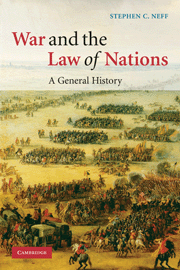PART III - War as state policy (1815–1919)
Published online by Cambridge University Press: 30 July 2009
Summary
War is a political act by which the States, being unable to reconcile what they believe to their duties, their rights and their interests, resort to armed struggle, and ask that armed struggle to decide which of the two being the stronger will be able by reason of force to impose its will upon the other.
Théophile Funck-Brentano and Albert Sorel[W]ar is a fact that alters in a variety of ways the legal relations of all the parties concerned. It therefore tells one how the condition of belligerency is created, and what are the rights and obligations of belligerents towards each other and towards neutrals. But it does not pronounce upon the moral questions that occupy such a large space in the writings of the early publicists.
T. J. LawrenceIn the nineteenth century, war reached its pinnacle of legal prestige, when it attained the exalted status of an ‘institution of international law’. To a degree unequalled any time before or since, it was frankly recognised by international lawyers as an accepted and routine means of conducting everyday international business. In international politics, as well as in economics, it was a laissez-faire era. It was also, in legal terms, a ‘positive’ era – so much so, as to cause the whole nineteenth century to be grandly denominated as the age of ‘positivism’. Positivism was so protean a phenomenon as to defy any neat characterisation. But some of its more salient features may be noted very briefly.
- Type
- Chapter
- Information
- War and the Law of NationsA General History, pp. 159 - 166Publisher: Cambridge University PressPrint publication year: 2005



